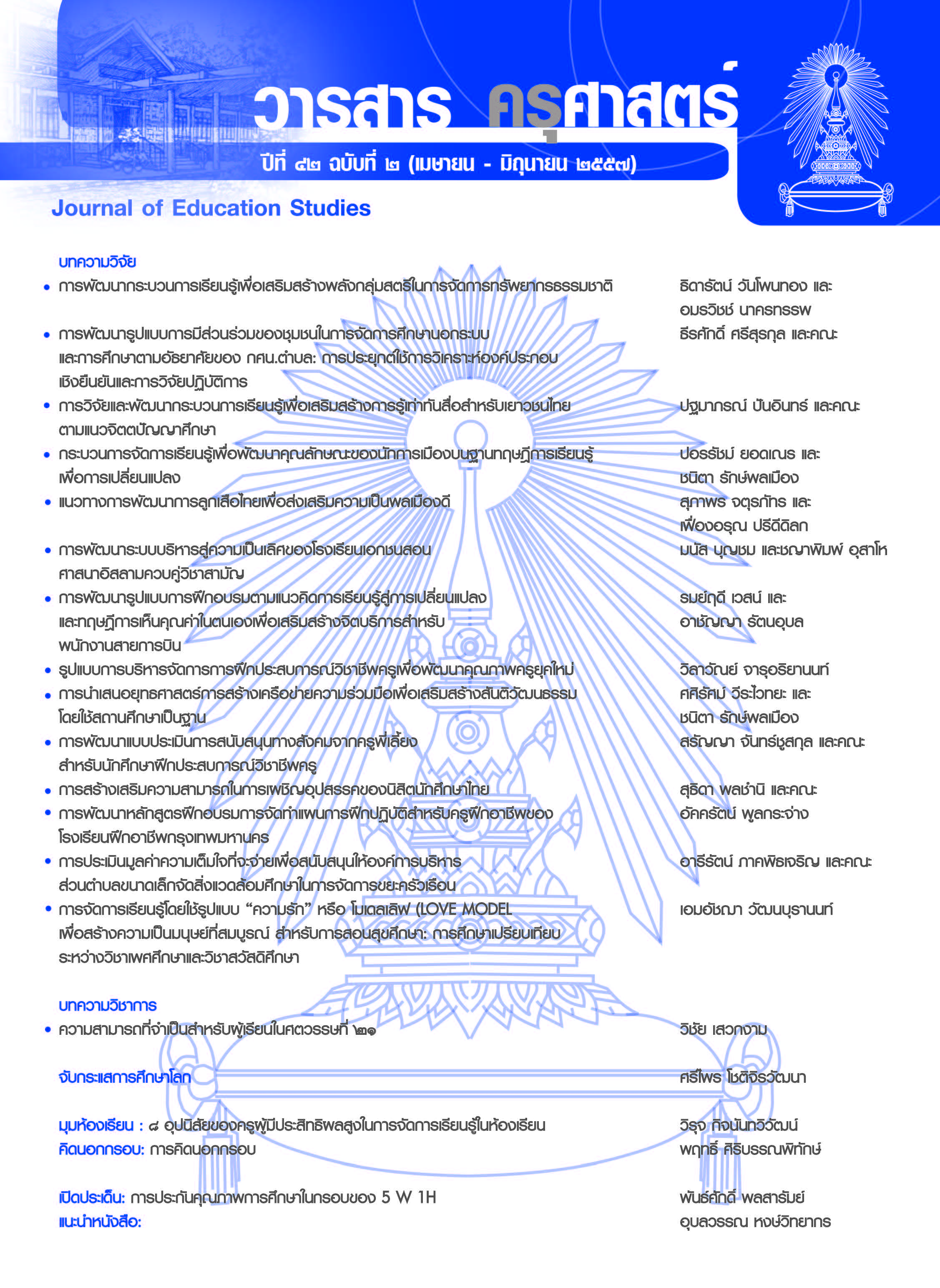แนวทางการพัฒนาการลูกเสือไทยเพื่อส่งเสริมความเป็นพลเมืองดี
Keywords:
การพัฒนา, การลูกเสือไทย, พลเมืองดี, DEVELOPMENT, THAI SCOUTING, GOOD CITIZENSHIPAbstract
การวิจัยนี้เป็นการวิจัยแบบผสมระหว่างการวิจัยเชิงปริมาณและเชิงคุณภาพ มีวัตถุประสงค์ ๑) เพื่อศึกษาสภาพการจัดการการลูกเสือไทยในอดีตและปัจจุบัน และ ๒) เพื่อศึกษาแนวทางการพัฒนาการ ลูกเสือไทยเพื่อส่งเสริมความเป็นพลเมืองดี กลุ่มตัวอย่าง ได้แก่ บุคคลทั่วไปที่ผ่านการเรียนกิจกรรม ลูกเสือ ลูกเสือ ผู้กำกับลูกเสือ ผู้อำนวยการลูกเสือโรงเรียน ผู้เชี่ยวชาญและผู้ทรงคุณวุฒิด้านการ ลูกเสือไทย โดยใช้วิธีศึกษาเอกสาร การสำรวจโดยแบบสอบถาม เทคนิคเดลฟายและการสัมภาษณ์ เชิงลึก วิเคราะห์ข้อมูลเชิงปริมาณด้วยสถิติภาคบรรยาย และเชิงคุณภาพโดยจำแนกประเภท เปรียบเทียบข้อมูล และสร้างข้อสรุปแบบอุปนัย
ผลการวิจัย พบว่า ๑) กระบวนการการลูกเสือไทยในอดีตและปัจจุบันมีความสอดคล้องกันใน ด้านการสอนให้ลูกเสือมีความจงรักภักดีต่อชาติ ศาสนา พระมหากษัตริย์ รู้จักการคิดวิเคราะห์อย่างเป็น ระบบ แก้ปัญหาเฉพาะหน้าและมีการฝึกวินัยให้ลูกเสือเป็นผู้มีความซื่อสัตย์ ๒) แนวทางการพัฒนาการ ลูกเสือไทยเพื่อส่งเสริมความเป็นพลเมืองดี ควรมีการกำหนดวิสัยทัศน์ พันธกิจ บทบาทหน้าที่ และ มีเกณฑ์มาตรฐานอย่างชัดเจน การจัดกิจกรรมลูกเสือเน้นความซื่อสัตย์และเรียนรู้ด้วยการปฏิบัติจริง มีการส่งเสริม พัฒนา สร้างคุณค่า และสร้างขวัญกำลังใจให้แก่ครูและบุคลากรทางการลูกเสือ มีการ กำหนดภารกิจ อำนาจหน้าที่ วิธีปฏิบัติและสร้างความร่วมมือของเครือข่ายการลูกเสือไทย รวมทั้ง ต้องสร้างให้สาธารณะชนเห็นคุณค่าและพัฒนาระบบฐานข้อมูลให้มีประสิทธิภาพ
This study was a combination of quantitative research and qualitative research. The objectives of this study were: 1) to study the management of Thai scouting in the past and present; and 2) to study the guideline for the development of Thai scouting to enhance good citizenship. The samplings consist of individuals who have scouting experience, scouts, scout leaders, scout directors at school, Thai scouting experts, and adult resources. The research methods were documentary research, questionnaires, the Delphi technique, and in-depth interviews. Descriptive statistics were used for quantitative data analysis. In addition, classif ication and inductive conclusions were used for qualitative data analysis.
The research indicated the following two signif icant results: 1) the management of Thai scouting, both in the past and present, was consistent in terms of teaching for enhancing loyalty towards the three main national sacred institutions: nation, religion, and monarchy, as well as enhancing systematic thinking skills, unexpected-problem solving skills, and practicing them to enhance discipline and honesty, and 2) making guidelines for developing Thai scouting to enhance good citizenship should consider vision, mission, roles and benchmarks. Similarly, scouting activities should focus on integrity and learning by adhering to principles. Further development of teachers and adults of scouting should also be promoted with value-added concern. In addition, the assigning of missions, authorities, and practices are also necessary as well as enhancing networking, creating public awareness, and developing an effective scouting database.




